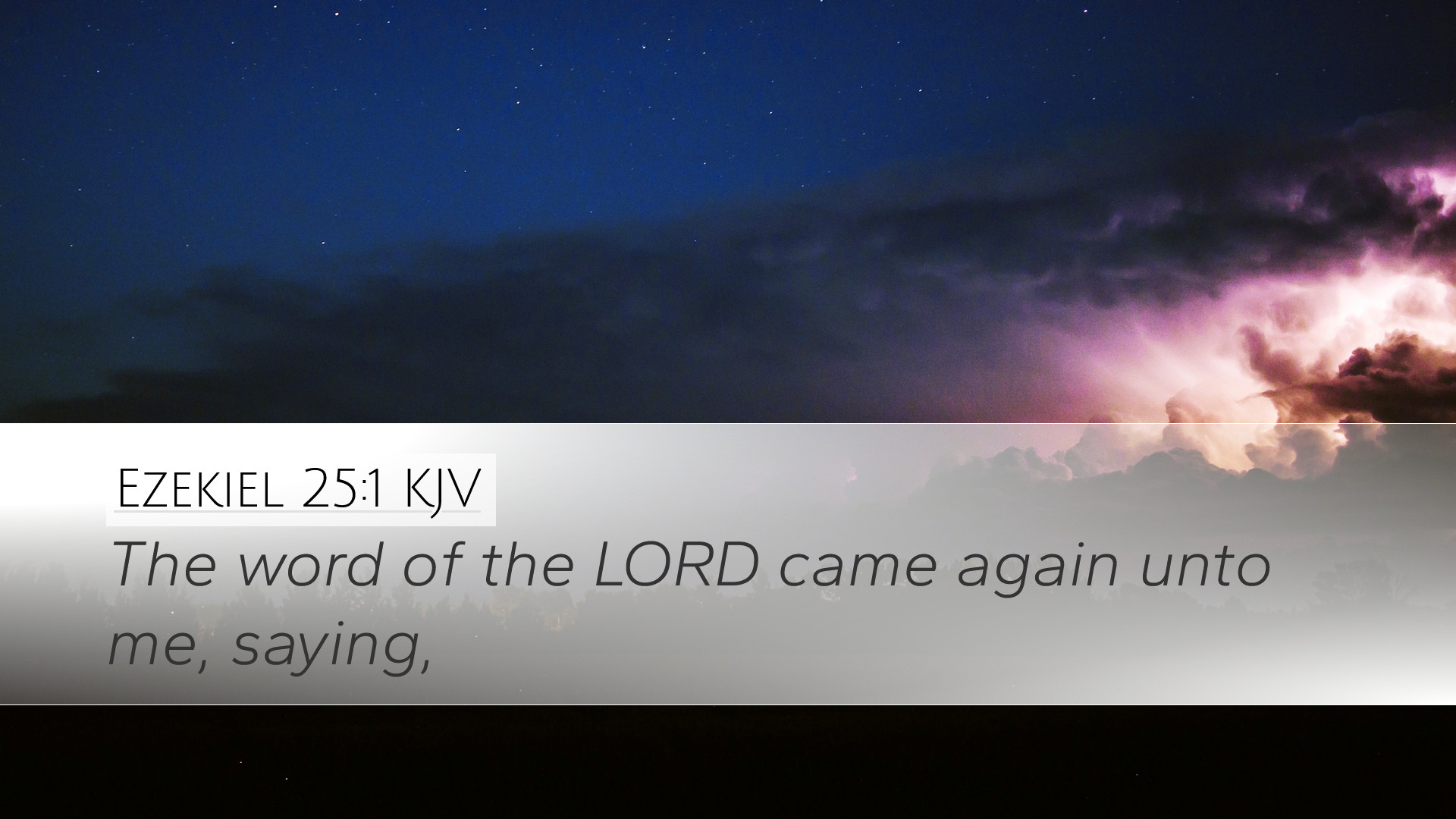Ezekiel 25:1 Commentary
This verse marks the beginning of a prophetic denunciation against the nations surrounding Israel and serves as a crucial pivot in the book of Ezekiel, illustrating the prophet's role not only as a messenger to Israel but as a voice of judgment to the nations.
Text of the Verse
Ezekiel 25:1 (KJV): "The word of the LORD came unto me, saying,"
Contextual Background
The prophecy in Ezekiel, particularly in chapters 25 through 32, addresses the judgment that God pronounced upon various nations. This includes Ammon, Moab, Edom, Philistia, Tyre, and Egypt, underscoring God’s sovereignty over all nations and His concern for Israel's destiny in the midst of such geopolitical turmoil.
Insights from Public Domain Commentaries
Matthew Henry's Commentary
According to Matthew Henry, this initial verse serves as a prelude to the specific judgments that follow. He notes that the phrase “the word of the LORD came unto me” signifies divine authority. It is not merely a human opinion but a profound revelation that must be heeded. Henry emphasizes that this declaration of judgment upon nations reflects God's justice and His right to govern the affairs of all nations, a theme consistent throughout Scripture.
Albert Barnes' Commentary
Albert Barnes, in his commentary, points out the significance of the term "word of the LORD." It serves to remind readers that the judgments against the nations are spoken with the authority of God Himself, reinforcing that the outcomes are divinely orchestrated. Barnes elaborates on the nations being addressed, suggesting that their downfalls serve both as warnings and as assurances to Israel that God remains in control of history and destiny. The prophetic nature of this verse sets the stage for an understanding of sin and judgment not only as abstract concepts but as realities that nations must face.
Adam Clarke's Commentary
Adam Clarke provides a more detailed examination of the specific nations mentioned in subsequent verses. He argues that this prophecy is a demonstration of God’s omnipotence and His role as a judge of the earth. Clarke stresses that God's judgments depicted in Ezekiel are not arbitrary; rather, they stem from the actions of these nations against Israel and their disregard for God's covenant. He emphasizes that the judgments serve a twofold purpose: they affirm God's holiness and His commitment to justice while offering a message of hope and restoration to His own people.
Literary and Theological Themes
This verse, while seeming straightforward, opens a discussion regarding the broader themes of divine sovereignty, justice, and the role of prophecy. The clear communication of God's intentions through the prophet Ezekiel illustrates the importance of prophetic voices in the life of Israel and provides a framework for understanding the unfolding narrative of God's plan for His people amidst a backdrop of judgment against their enemies.
The Sovereignty of God
Both Matthew Henry and Adam Clarke explore the sovereignty of God as a central theme in Ezekiel. The declaration of judgment against foreign nations confirms that no nation can operate independently of God's will. This theme reassures believers that despite worldly chaos, God's plans will ultimately prevail.
Divine Justice
The context of divine justice is emphasized throughout these commentaries. The judgments pronounced are not arbitrary; they are rooted in the moral order established by God. Each judgment serves as a reminder that God holds nations accountable for their actions, especially concerning Israel, His chosen people.
Promise of Restoration
A significant theological underpinning in Ezekiel, though emerging from segments of judgment, is the promise of future restoration. As God addresses the nations, He is also reminding Israel of His faithfulness. The underlying hope is that despite their current adversities, God’s everlasting covenant will prevail.
Application for Pastors and Theologians
For pastors, this passage serves as an imperative reminder of the balance between grace and judgment. The role of proclaiming God’s word might sometimes involve declaring hard truths about sin and accountability. For theologians and Bible scholars, the intricacies of this passage prompt deeper exploration into the nature of prophetic literature and its implications on contemporary faith communities.
Reflection Questions
- How does the message of divine sovereignty in judgment shape our understanding of God's character?
- What implications does the prophecy against nations have for our contemporary context?
- In what ways can we balance the themes of judgment and hope in our ministry?
Conclusion
Ezekiel 25:1 serves as a pivotal entry point into a broader discussion of divine judgment and sovereignty over the nations. The insights from public domain commentaries reveal the richness of this passage, encouraging a reflective engagement with its themes. As believers explore these scriptures, they are invited to comprehend not only the power and justice of God but also the hope and reconciliation that come through His judgments.


